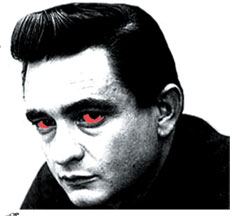In the world of popular music, artists, sounds, and trends come and go as frequently as the seasons. One day you’re hot, the next day shit starts falling off. Soon an artist’s career will grow colder than a well-digger’s ass. Sure—once in a while someone special will survive a year or two if properly nurtured. Most end up as just another rotting layer of compost on an ever growing heap of musical debris.
To survive not only a winter or two, but to grow into a
into a
towering sequoia takes a great deal of resiliency, purity, and raw strength that most of us will never know. An artist of this caliber must have the ability to transcend genre, time, and any notions of what is hip. Their work remains timeless, undiminished by cheesy gimmicks or questionable fashion choices. Furthermore, their collected output, while being artistically diverse, must retain a level of integrity that never lets you feel as if you’ve been cheated.
One artist who stands tall in the mostly clear-cut forest of musical history is Johnny Cash. We all know the songs. How could we not? Through his autobiography and recent biopic, we also know a little bit about the man. What most people don’t know is why we all have a
special place in our hearts for both.
Johnny Cash was a man from humble beginnings who, through hard work and singularity of purpose, achieved success beyond his wildest dreams. He was the embodiment of the true American dream—
life, liberty and the pursuit of happiness. He used his acquired fame to
rail against those who perverted that dream into engaging in unjust wars, institutionalized classdivisions,
and other social injustices.
His songs often echoed the hopelessness many people feel daily. Other songs tapped the raw emotions we’ve all felt, from undying love to murderous rage. But it wasn’t always heavy or dark. Hell—some songs were just plain silly!
Cash also had an innate ability to work in wildly
divergent situations while retaining a sense of integrity, as well as a sense of humor. The same guy who sang of shooting a man in Reno just to watch him die—decades before gangsta rap, I might add—could also show his lighter side on The Muppet Show. The same guy who played “Folsom Prison Blues” in Folsom Prison also graced an episode of The Simpsons!
And then there’s that voice—deep and weathered, yet infinitely melodious. Cash had a voice that immediately betrayed the physical and emotional scars received in his often tumultuous life. Yet there was something soothing about it. It was like being a little kid and hearing your father assure you that he just killed the monster in the closet and that you could go back to sleep. You just instinctively trusted that voice and knew that no matter what happened, everything was going to be all right.
All of those reasons obviously contribute to our admiration of the Man in Black. But the real reason Johnny Cash touched so many of us is that he seemed to be one of us. Musicians, truck drivers, strippers, trash collectors, farmers, felons, or even presidents—we’ve all done things to various degrees that we regret. His songs, whether he wrote or simply interpreted them, often touched on themes of sin and redemption. There’s not a soul alive who hasn’t felt as if they’ve fucked something up way beyond repair at one time or another. Johnny Cash was the voice for those wishing for a second chance—something we all deserve but few get.
His music remains not only a beacon of hope in a world of despair, but also as a cautionary tale to those who would let their darker instincts envelop them. As a human being,
Cash serves as a reminder that being thoughtful and
sensitive doesn’t preclude you
from being a badass. Most of all, Johnny Cash proves false the old adage that there are only two kinds of music: good and bad. There is a third.
Johnny Cash made great music.
Rich Evans is the singer for 1234 and author of the soon-to-be-released book Why I Didn’t Kill Bon Jovi.





